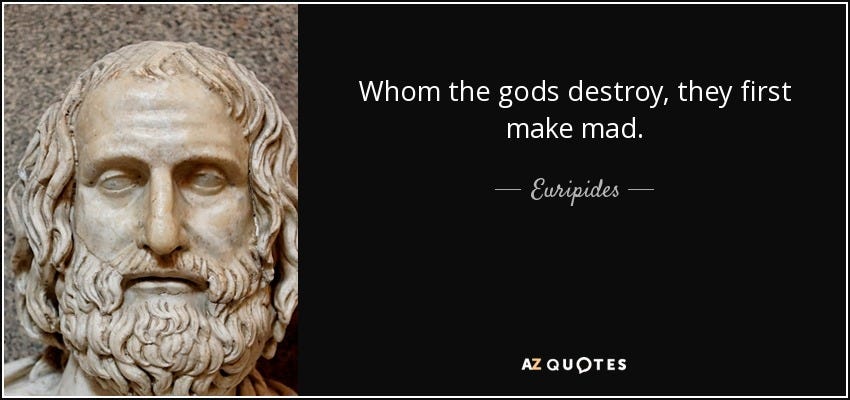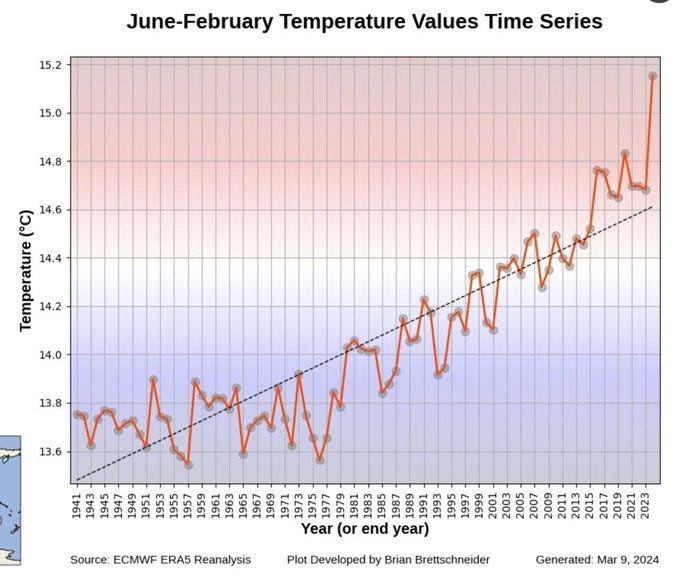Yves here. At its foundation, our denial of the seriously-bad-and-coming-way-ahead-of-schedule impact of climate change greatly resembles our denial of death. Aside from the devoutly religious and those who have had near death experiences, most of us do not want to think about death or climate change seriously. So as readers might have inferred, I’m not big on hope.. Hope as opposed to realism too often produces in/inadequate action, like Green New Deal rainbows and unicorns.
By Thomas Neuburger. Originally published at God’s Spies
Tho’ much is taken, much abides; and tho’
We are not now that strength which in old days
Moved earth and heaven, that which we are, we are
—Alfred Lord TennysonAll your cryin’ don’t do no good
Come on up to the house
Come down off the cross, we can use the wood
Come on up to the house
—Tom WaitsDoes death make life less sweet?
—Yours truly
I’ve been wanting to write for a while about how we could respond to the coming climate disaster, the Jackpot, in William Gibson’s terms. Respond to that which will be, in world-historical terms, the most important global event since the birth of brains and culture that we call us.
I’ve started that project with few paragraphs here and here. But I wanted to give these thoughts a proper page.
The Push to Offer Hope
Let’s start with this, from scientist Kate Marvel:
As a climate scientist, I am often asked to talk about hope. Particularly in the current political climate, audiences want to be told that everything will be all right in the end. And, unfortunately, I have a deep-seated need to be liked and a natural tendency to optimism that leads me to accept more speaking invitations than is good for me. Climate change is bleak, the organizers always say. Tell us a happy story. Give us hope. The problem is, I don’t have any.
“Give hope” is the constant admonishment in the climate world. Consider this from Kaitlin Naughton, a scientist with the British Antarctic Survey, writing at The Conversation: “The conventional wisdom is that you’re supposed to give people hope: to say that there’s a disaster behind one door, but we can avoid it if only we choose a different one.”
This is more than a conventional wisdom. The strategic argument is: If you depress people with downer talk, they’ll shut down and then won’t act. We need people to act. (Implicit: Because we can still win, preserve high-energy life.)
And this become almost a moral admonition, a subject of values examination, and occasionally, of shaming. “Don’t talk of the millions lost (dollars, lives). Talk of the gains — new jobs, a greener economy. Don’t be Debbie.”
That’s all well and good. But what if it looks to you, as it looks to increasingly many, that the die has been cast? Do you lie? Perform cheerleader duty? Or acknowledge the truth (as you and your audience may see it), and offer, not hope, but something more true to the facts?
Facts on the Ground
The fact is, we’re not doing something about climate. You noticed that, right?
And you noticed, I hope, the reason: that we — by which I mean both parties — are ruled by the (gotta say it) money-mad psychopaths who have placed a lock on the whole electoral process, from debate to ballot access, making sure only a money-fed candidate can win. (Yes, Trump was a money-fed candidate in 2016.)

Whom the gods would destroy, they first make mad. There more than enough hubris in our power-mad betters to sink the lot of us. Even if climate weren’t staring us in the face, how soon will we fix that? This decade? This century?
But climate is staring us in the face, a tsunami that almost visible to even the blind.

What do we tell people as they start waking up? What do we say when they get that there’s no going back?
We can tell them, while hope is a dream, courage is a thing they can do.
‘We Need Courage, Not Hope.’
Here’s what Kate Marvel, the aforementioned climate scientist, has recently written. First, she states the problem (my emphasis throughout):
I have lived a fortunate, charmed, loved life. This means I have infinite, gullible faith in the goodness of the individual. But I have none whatsoever in the collective. How else can it be that the sum total of so many tiny acts of kindness is a world incapable of stopping something so eminently stoppable? California burns. Islands and coastlines are smashed by hurricanes. At night the stars are washed out by city lights and the world is illuminated by the flickering ugliness of reality television. We burn coal and oil and gas, heedless of the consequences. …
There is now no weather we haven’t touched, no wilderness immune from our encroaching pressure. The world we once knew is never coming back.
This is speaking more honestly in public than most people like her will do. (In private, most know the truth. They’re freaking out.)
And the answer:
And here, the sheer scale of the problem provides a perverse comfort: we are in this together. The swiftness of the change, its scale and inevitability, binds us into one, broken hearts trapped together under a warming atmosphere.
We need courage, not hope. Grief, after all, is the cost of being alive. We are all fated to live lives shot through with sadness, and are not worth less for it. Courage is the resolve to do well without the assurance of a happy ending.
There’s Joy in Working Together
We’re in this together. The Romans have crossed the border. Our elders may escape via death (thinking of you, Charles G. Koch), but those in their thirties will see children of people like them live lives decidedly different than those like our own.
Scary things happen; they happen all the time. And just as good people pass, so do civilizations. There are miracles in the world, but we can’t call them up.
What we can do is give the best of ourselves — our wisdom, our love, the example of courageous response — to those who share our burden and our grief.
“That which we are, we are,” said Tennyson’s Ulysses. And that’s not nothing, so long as we still have life. We can do this together, deliberately joined in the task. There is joy in those acts, which we will carry inside despite the beast at the gates.
I’d rather have that, the ability to act with courage, than live in unwarranted hope. For starters, it’s better for others who may need the wood.


